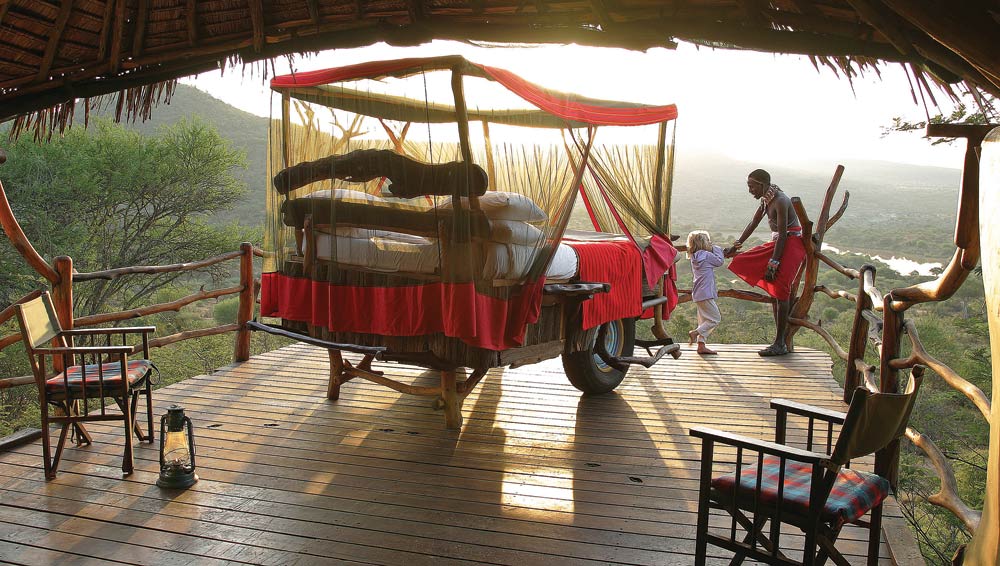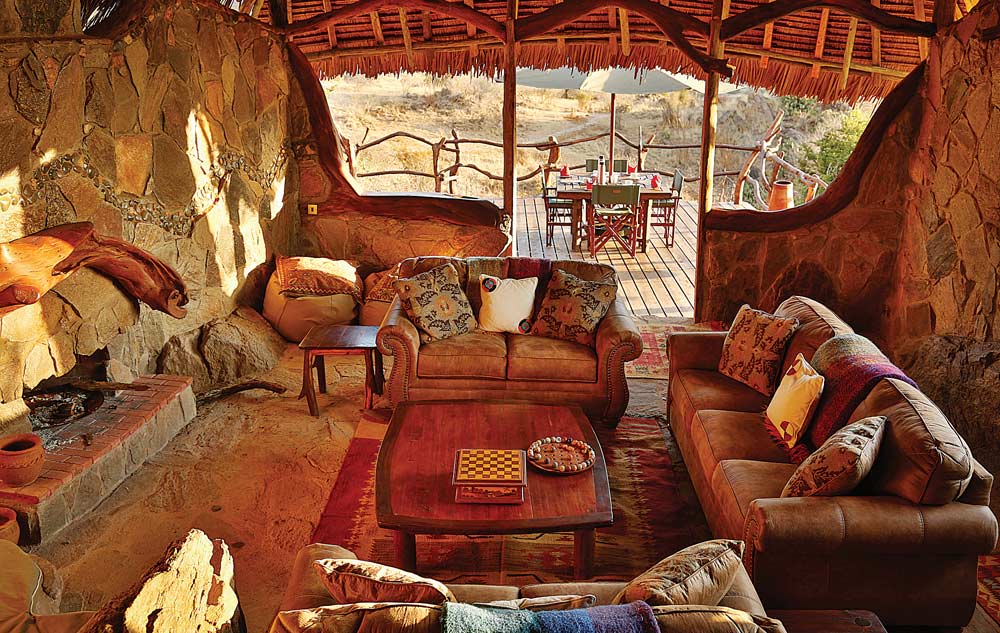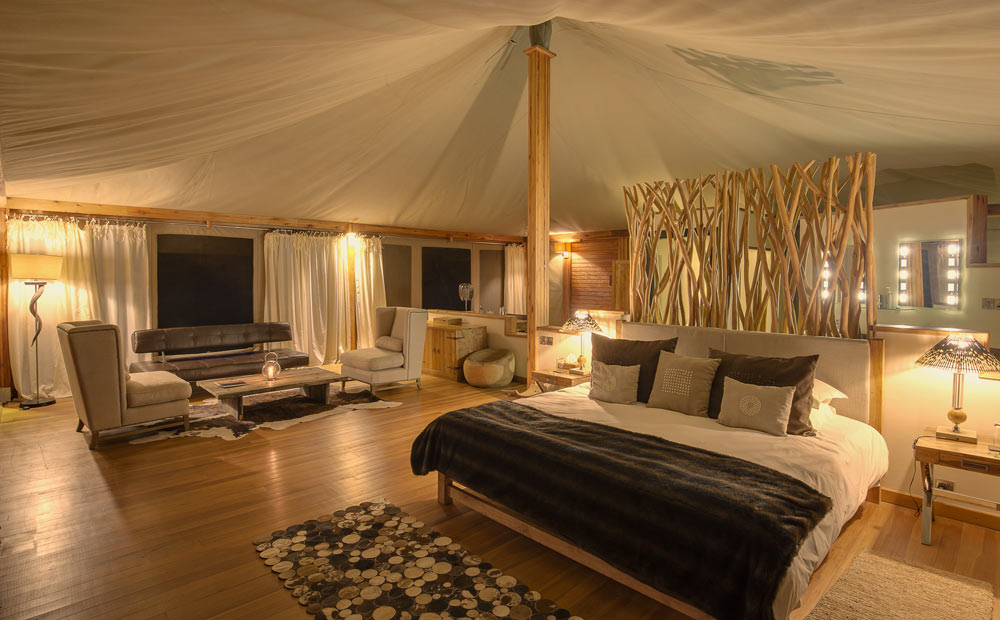The destiny of mankind is painted in the stars. Or so they say. But this is not news to the people of Loisaba. They’ve known it all along. In this part of the world, the local Samburu warriors have always lain beneath the stars. They use them to divine the nature of the coming seasons. They watch them for omens: some good, some bad. Indeed, should you get into conversation with one of these young men, he’ll probably tell you that, although he watches cable TV most nights, he learns more about current affairs from the stars than he’ll ever glean from CNN. He may also express surprise at the fact that those ‘who live close to the stars, in tall buildings that nearly touch the sky’, have only recently become aware of the phenomenon of global warming. The local Samburu seers predicted it decades ago.
Loisaba Conservancy
Loisaba, a wilderness conservancy in northern Kenya, is a star-gazers Nirvana. Its name, translated from the Samburu, means ‘the Seven Sisters’. Also known as the Pleiades, this is a particularly brilliant star cluster lying some 440 light-years from earth. But it’s only when you’re lying flat on your back beneath it that you can fully appreciate the fact that the Pleiades is one of the closest star clusters to earth. The local Samburu already know this. But then Samburu mythology claims that their original home was on the so-called ‘Morning Star’ of Venus. So they’re more star-savvy than most.
Samburu warriors, of course, don’t mind lying flat on their backs amid the velvet blackness of a lion-stalked night in order to catch up on the latest star news. Visiting space cadets, however, need beds, supper, chilled wine, and hot and cold running water.
The Elewana Loisaba Star Beds
Anchored in a sea of acacia bush punctuated by ambling herds of fudge-grey elephants, is a small flotilla of wooden arks. Single-storey platforms constructed from the contorted limbs of elephant-felled wildwood, each has a stair-ladder leading to a partially thatched wooden deck, which houses a cosy living area, shower and WC.

Out-thrust from this tree house is an apron of a deck. This is the stage upon which the star bed performs. A four-poster bed fashioned entirely from wildwood, bolted to a gargantuan chassis, and closely swathed in thick green net curtains, it resembles some ponderous medieval chariot. Pushed by a posse of warriors, it lumbers forth from its lair as the Seven Sisters rise in the sky. And waits for its star-gazers to climb aboard.

First, though, comes supper, which is staged in the quaintly elegant, stone-flagged, reception area, which lies below the star bed platform. Later you may sip your drink by the fire and chat with the star bed’s warriors. Gently diffident, impeccably polite, yet eager to converse, most of them sport a jaunty red and yellow plastic tulip, wired to their traditional Samburu headbands. Should you ask why they wear a tulip on the top of their heads, they will tell you that it should really be a blossom of indigo-blue ‘morning glory’ picked dew-fresh from the bush, and worn in celebration of the glory of the ‘Morning Star’ from which they came. But that plastic flowers are more reliable.
Eternity shines down
Night falls with conviction in Loisaba. The blackness is profound. The nearest city is hundreds of kilometers away, but the acoustics deliver all the glitter you need. There’s the gurgle of the river, the whoop of the nightjars, the rumbling of the elephants and the distant cough of a lion on the prowl. You climb the stairway to the stars, lamp in hand. The warriors depart softly to their sentry posts; you heave yourself up into a cocoon of netting, pillows, quilts, blankets and hot water bottles. And then you look up. And eternity shines down upon you. The infinite glory of the constellations rains like showers of diamonds around you. And your soul flies out to meet the Seven Sisters.
Where we stayed
The Loisaba Conservancy, 226 sq km of privately-managed wildlife conservancy, lies in the picturesque Laikipia region of Kenya, some 100 kilometres north of Nairobi. A prime example of the successful collaboration between conservation, communities and tourism, this pristine wilderness promises 250 species of birds and 50 species of mammal (including elephant, buffalo, Grevy’s zebra, greater kudu, reticulated giraffe and wild dog).

Elewana Loisaba Tented Camp offers 12 uniquely luxurious tents, two infinity pools and a central social area. Activities include: game drives, night drives, bird walks, horse-riding, camel-trekking, mountain biking, fishing, visits to the renowned anti-poaching sniffer dogs and a range of colourful cultural interactions. And, of course, the chance of a night beneath the stars at the Elewana Loisaba Star Beds.
For more information, visit: www.elewanacollection.com
Our trip was organised by Cheli and Peacock Safaris: www.chelipeacock.com
© 2025 Kenya Holidays
